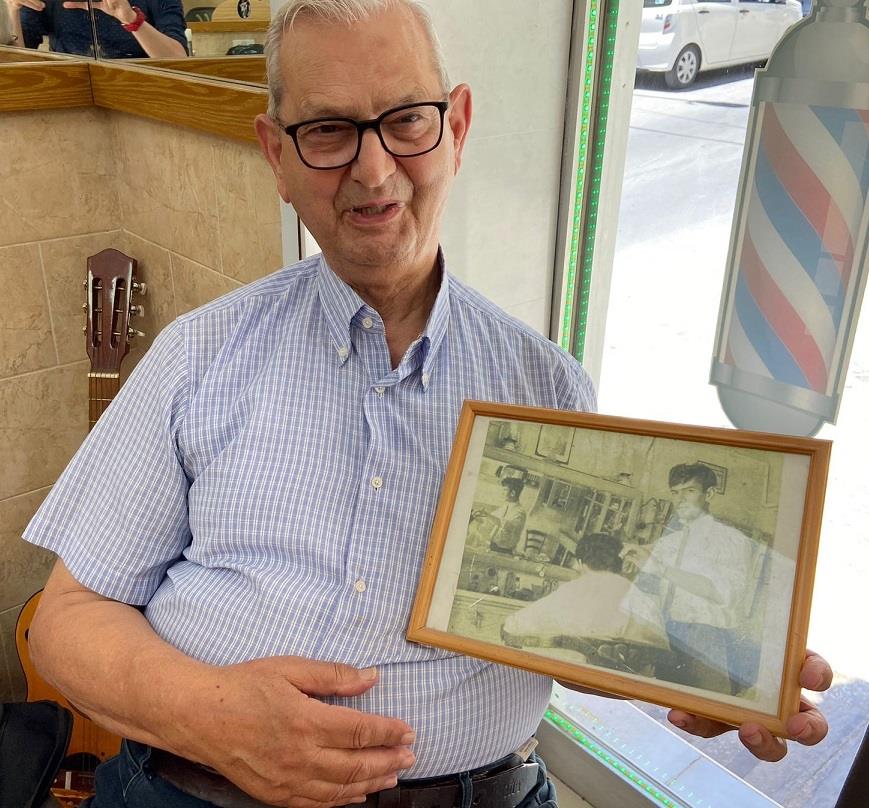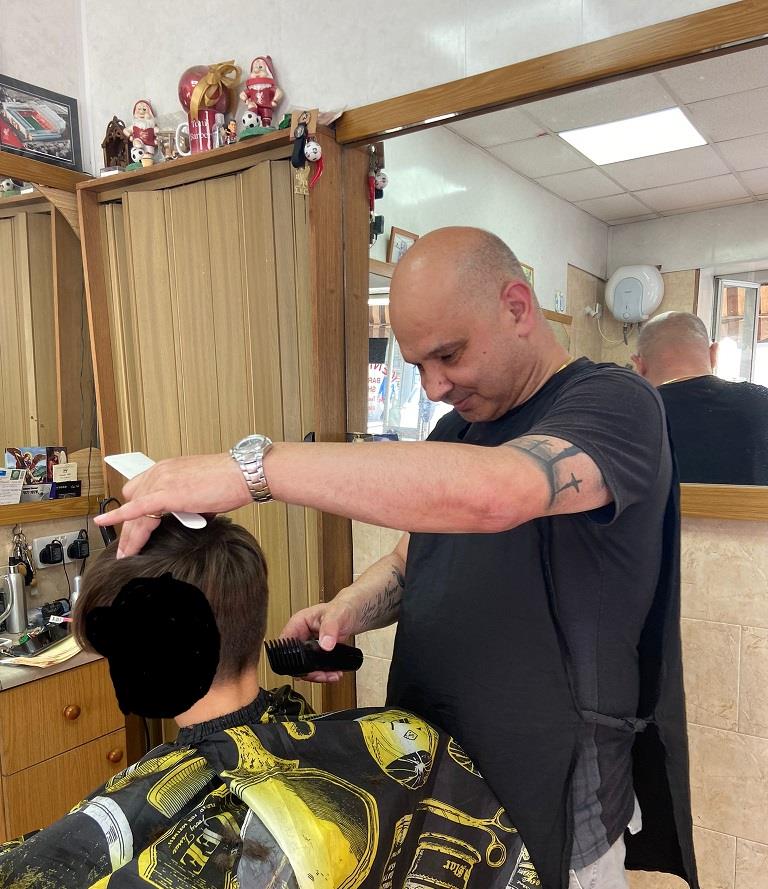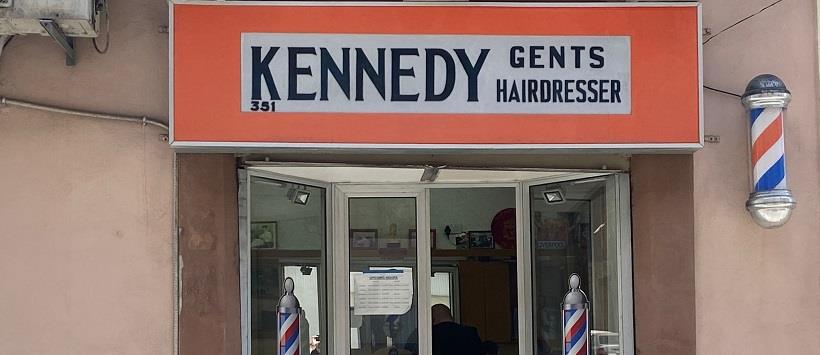Kennedy Barbershop by Tony and Dad, found on a corner down Manwel Dimech Street, Sliema, is a family-run, and proudly old-school "Maltese barbershop" with a history spanning decades. Through the grooming craft, passed down the family, the father-son partners have catered for everyone from tourists to presidents. And in a business that is increasingly overcrowded, by locals and foreigners, they adhere firmly to upright and self-less principles.
Saviour Gatt, the so-called "Dad" of the shop sign, is known by his nickname Salvu ta' Ġiraldu l-Parrukkier, and is from Żebbuġ, on the side of Madonna ta' Lourdes. He said he is proud of his nickname for two reasons; first as it pays homage to his own father who started it all, and secondly, "What are you if you don't have a nickname?"
Salvu said that the grooming tradition began from Ġiraldu, his father, who was a part-time barber while he worked full-time at the dry docks, post-war, and eventually at the Pitkalija. He said that Ġiraldu taught him the trade and let him practise on local children or an occasional old man for a free haircut, and added that any mistakes he would make would be fixed by his father.

Salvu Gatt, proudly showing off an old photo of the barbershop many years ago
Ġiraldu started it all, as from his father's side, there came a long line of barbers and even female hairdressers, Salvu said. He listed that Ġiraldu's sons, himself and his brother, Mario were both trained barbers, with Mario being taught the trade by Salvu, his brother. In turn, he said that both of Mario's sons were trained as barbers with one of them having the popular Top Brands franchise with about 30 outlets over Malta. Furthermore, he said that his other brother, Philip, has a daughter who is also a hairdresser. As for his own children, Salvu said both his sons Antoine and Martin were trained by him, with Antoine, known as Tony, running Kennedy alongside him while Martin had barbershops in Birkirkara and Paola.
Salvu said that his father wasn't just a barber, but also a hard worker and one of the few literate men in Żebbuġ. Because of his literacy, Ġiraldu would regularly help local farmers read and write letters to family in Australia, as well as help them in paying their qbiela (rent for fields); so much so, that, on Sunday mornings, Ġiraldu would gather five to six people in a small room to help them with their affairs, at no cost, Salvu said.
Salvu mentioned that Ġiraldu eventually earned the title of "village notary" in Żebbuġ and was so beloved by the community that, despite not being partisan or interested in local bands or football, all the clubs in Żebbuġ hung their flags at half-mast in his honour when he passed away in 2003.
Salvu said he started work in a rented room at 4, Debono Street, Żebbuġ, just down from the Police Station, alongside his father until Ġiraldu retired and the shop was returned to the owner. He said that, at the time, the rent was Lm4 per year (€9.31) and the price for a cut and a groom was 1c of a Maltese lira that eventually rose to 5 cents for children's cuts and a 7c5 for adults before he left Żebbuġ in 1963. He added that though it doesn't seem like much, at the time it was good pay and calculated according to the wages of the time.

Tony Gatt, who has taken over the profession of barber from his ancestors
Following Ġiraldu's retirement, Salvu said that aged 16 he went to Sliema to work as a shop assistant for a while but kept on cutting hair part-time. He said that following the death of his boss, he took up being a barber full-time, eventually shifting to Sliema at 18 years due to better work hours.
Salvu said that he didn't begin at the current Kennedy, rather, he rented a shop in St Dominic Street, which he named Oxford in honour of a barber-friend of his. He said his friend would regularly teach him new techniques in the Oxford barbershop in Valletta, the original namesake.
The move to Sliema, specifically to St Dominic Street, was not an easy one, Salvu said. He said that the location of the shop was out of the way and business suffered so much that, as a newly-wed trying to build a new life, he applied to migrate to Australia for better prospects, much against his wife's wishes.
As he waited for his emigration papers to come through, Salvu said that he met a local cobbler at the lotto shop who told him about a shop on the main street. He said that after looking into the tip, the same day he got the keys of the new shop he got approval to move to Australia. He pointed out that if the letter of approval had come by morning post, not by afternoon post, he wouldn't have taken the shop and he would have emigrated. He stated that, ultimately, his life's path was determined by a two-hour postal delay. Today, following holidays to Australia, Salvu says that he cannot imagine himself living there.
Salvu said that the move increased business substantially, particularly, with the patronage of English servicemen from St Patrick's barracks. He said that the departure of the English in 1979 hit the business hard once again, at which point, apart from cutting hair, he started selling souvenirs, which he kept up until the introduction of VAT.
The departure of the English threw his family into hard times with money being tight, Salvu said, but he persisted and worked harder at all the hours customers would show up. Despite this, he said that he never forgot the time he used to work for a lira-and-a-half a week and never got greedy.
Kennedy Barbershop by Tony and Dad came about when his son Antoine, known as Tony, used to work part-time at the barbershop, with a full-day on Saturday, alongside his full-time job at a gold refinery, Salvu said. Tony shared that he had been practising alongside his father since he was 15 years old. However, just days after his wedding, the refinery closed. Tony said that he became a full-time barber that way and was thankful for the client base he had accumulated from his part-time barbering.
The most recent turbulence in the business was due to the Covid-19 pandemic, Salvu said. "It smashed us," and forced them to close. He added that as a part-timer and a pensioner he was not eligible for the work subsidies of the time. And meanwhile, he said, he would get furious to see the Prime Minister addressing the nation at the time with a fresh haircut, while the business was closed and they were struggling.

With regards to the change in the grooming industry, Salvu said that all the new "skills" such as hairdressing and styling originated from the classical barber and pointed out that his father would cut women's hair too. Having said that, Salvu noted that as hair stylists became more popular, the classic barbers went under, until recently when trendy, new barbershops opened and used new English terms like "rinse" or "wax" despite old barbers providing the exact same services. In a nutshell, "if it's not in English, it's antiquated", he said. Salvu also took the opportunity to point out that Kennedy is, proudly, a traditional Maltese barbershop that offers a cut and a shave, no more, no less.
Tony added that despite the publicity of the new barbers, he knew for a fact that they had the skill passed down to them too and while they may be well known on modern media, Kennedy relies on word-of-mouth promotion. He said that this has brought them people from Mellieħa to Marsaxlokk, including a president whose previous barber had passed away and had Kennedy recommended to him. Salvu also pointed out that during the pandemic, they offered the president a haircut themselves yet he refused in order to abide by the regulations.
Salvu said that competition in the grooming sector has always been fierce, with barbers back in 1960s Żebbuġ opening for the first mass at 4.30am and remaining open late into the night until they all closed together in a bid not to lose any customers.
Tony noted that, given the well-known historical competition, fashion trends now change annually. To stay ahead, he monitors popular media, such as the hairstyles of famous footballers, to anticipate upcoming trends. At the end of the day, Tony said that to date they have served up to five generations of clients.
Salvu stressed that 'Kennedy' abides by certain principles, indeed, he had named his shop after the American president because of the quote, "Ask not what your country can do for you - ask what you can do for your country,". He said that he abided to this principle in his work as well as in his social activities such as his being on the Msida Committee of Fishermen. He explained that this applies to work in the sense that the customer always comes first, no matter the time.
Kennedy's principles also regard the keeping of Sundays and feast days sacred, and so, closed, Salvu said. This is held despite the cut-throat competition of 24/7 barber shops which had caused many barbers to go out of business including a family member, he said. However, Salvu reasons, "To live you need to work and to work you need to rest, if you want to live well. Life is short and to work all the time will only make life shorter."